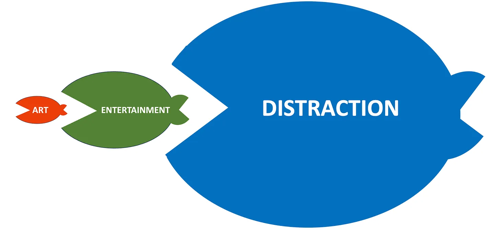Andrew Curry’s thoughtful newletter ‘Just Two Things’ arrives in my inbox three times a week (which, I confess, is slightly too often for me always to give it the attention it deserves). The two things he talks about today included some gems, though.
First, he looks at Ted Gioia’s article, The State of the Culture, 2024 , which comes with the subtitle ‘Or a glimpse into post-entertainment society (it’s not pretty)’.
Gioia talks about the old dichotomy between Art and Entertainment:
Many creative people think these are the only options—both for them and their audience. Either they give the audience what it wants (the entertainer’s job) or else they put demands on the public (that’s where art begins).
but he then describes how a dopamine-driven world is changing that into something more complex and rather more worrying. This is only the beginning:

It’s a good and interesting piece, and well worth reading, but if you find it depressing you should also read Curry’s comments, which suggest things may not be as bad as they seem.
In the second of his Two Things, Curry talks about an article by Paul Taylor in the London Review of Books. (So, yes, you’re reading my comments on Andrew Curry’s comments on Paul Taylor’s comments on other people’s books. This is starting to resemble that fish picture above!)
The Taylor article is also very good, and I won’t repeat too much of it here. I will, however, quote a section that Curry also quotes:
We should be genuinely awestruck by what ChatGPT and its competitors are capable of without succumbing to the illusion that this performance means their capacities are similar to ours. Confronted with computers that can produce fluent essays, instead of being astonished at how powerful they are, it’s possible that we should be surprised that the generation of language that is meaningful to us turns out to be something that can be accomplished without real comprehension.
I like this, because it echoes Quentin’s First Theorem of Artificial Intelligence, which I proposed here about a year ago.
What really worries people about recent developments in AI is not that the machines may become smarter than us.
It’s that we may discover we’re not really much smarter than the machines.
Again, the LRB article is well worth your time, if you can get through it before being distracted by things which offer you more dopamine.
Recent Comments